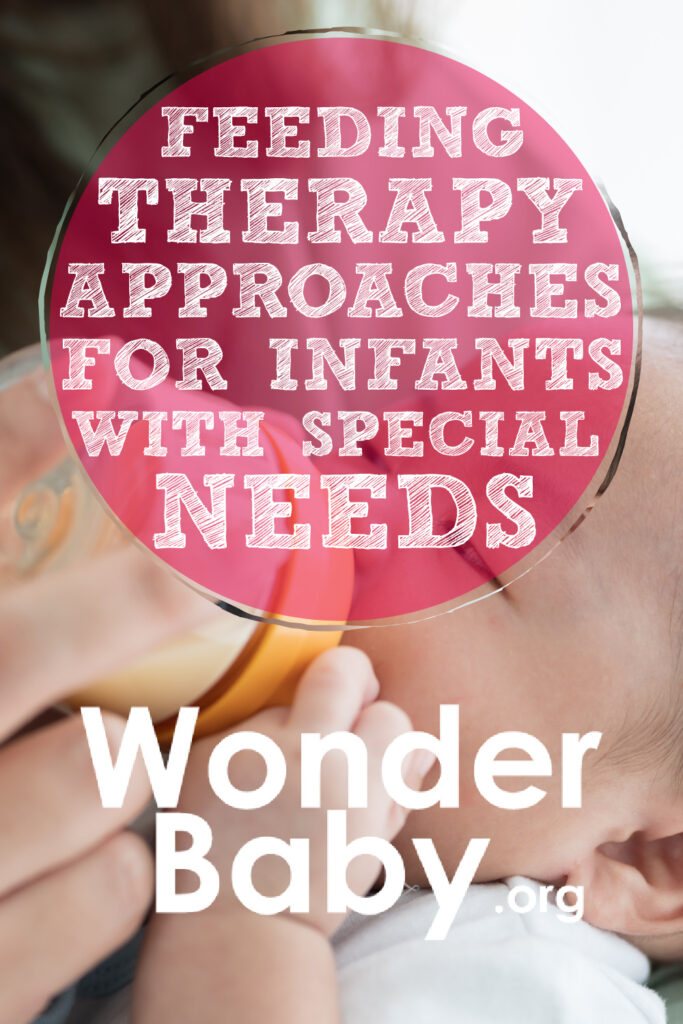Feeding Therapy Approaches for Infants with Special Needs

- Premature infants and children with special needs often have trouble with swallowing.
- Some children need specially prepared foods like thickened liquids or different textures to help them eat.
- Speech therapists and lactation consultants can help parents handle different issues with their child’s eating.
- Picky eaters or children who struggle with eating different foods may have sensory issues.
Feeding your new baby seems like one of the most basic tasks you’ll have to do as a new parent. However, if your child is born prematurely or with special needs, they may need a feeding therapist or require feeding therapy to keep them healthy.
Older children with special needs may also have problems eating. Picky eating or difficulty with changing food textures is often associated with special needs such as autism or sensory processing disorders.
Parents may feel discouraged or frustrated when their child refuses to or has trouble eating the way other children do. Fortunately, feeding therapy for infants and older children is an effective way to improve your child’s feeding skills and correct negative mealtime behaviors.
Feeding Therapy for Infants: What Parents Need to Know

Feeding therapy for infants usually requires the help of feeding therapists who can help your child figure out how to use the muscles in their mouth to handle eating food. Feeding therapy is most effective for infants and children who have trouble using their tongue, jaw, and other muscles correctly.
Feeding therapy helps children who have difficulties sucking, chewing food, using their tongue effectively, and swallowing.
Some infants need feeding therapy when they are just a few weeks old, while other children may not show signs of feeding problems until they start solid foods.
What Are the Different Approaches Used in Feeding Therapy for Infants?

There are a few different approaches used in feeding therapy for infants. Approaches vary based on the child’s needs and the therapist’s assessment of the infant.
Most therapists start by working on an infant’s oral-motor skills. For young infants, this usually means starting with thickened formula and progressing to normal thin liquids as the infant is able to swallow correctly. While it may seem counterintuitive, thick liquids are safer for babies who are having trouble and are less likely to go down the wrong tube and into the lungs.
After working on oral-motor skills, therapists often use a child-led feeding approach, allowing the child to choose when they are ready to experiment with new foods and flavors. The therapist will keep a food log of which foods the infant refuses and can introduce them again at a later time.
How Can Feeding Therapy Help Infants with Special Needs?

Infants with special needs may have problems developing the skills needed to enjoy eating and behave during meal time. Feeding therapy is one of several specific therapies that can help make feeding and mealtimes more enjoyable for the entire family.
Infant feeding therapy is similar to pediatric feeding therapy but focused on younger children. Many infants with special needs have trouble swallowing safely, chewing solid foods, or dealing with new textures.
In research published by the American Journal of Clinical Nutrition11. Lau, C.. Development of infant oral feeding skills: What do we know? The American Journal of Clinical Nutrition. 2016;103(2), 616S-621S. https://doi.org/10.3945/ajcn.115.109603, experts warn that many premature infants are unable to leave the hospital because they have trouble feeding by mouth, making it unsafe for them to go home.
Therapists will work with parents to help make infant feeding safer and less stressful. After an infant learns to chew and swallow safely, the therapist can move on to helping picky eaters eat vegetables or other foods that the baby refuses.
How to Tell if Your Infant Needs Feeding Therapy

The American Speech-Language Association22. Pediatric Feeding and Swallowing. American Speech-Language-Hearing Association. https://www.asha.org/practice-portal/clinical-topics/pediatric-feeding-and-swallowing/#collapse_6 states that there are three main types of feeding problems. These include:
Feeding Disorders
Feeding disorder is an umbrella term used to describe many problems children have with mealtimes or eating.
These may include: refusing age-appropriate foods or liquids, only accepting an extremely restricted variety or amount of foods or liquids, displaying disruptive or inappropriate mealtime behaviors, failing to learn self-feeding skills for expected age and development, or poor weight gain associated with too little food.
While all children can sometimes be disruptive during feeding time and have some food aversions, children with feeding disorders take this behavior to an extreme.
Avoidant/Restrictive Food Intake Disorder (ARFID)
Avoidant/restrictive food intake disorder is a problem with children who refuse food based on certain textures or because they fear the consequences of eating.
This disorder is diagnosed in children who experience significant weight loss or failure to achieve expected weight gain due to a significant nutritional deficiency. Many of these children depend on enteral feeding or nutritional supplements to meet their nutrient needs.
This condition is also associated with poor psychosocial functioning, especially around food and meal times.
Swallowing Disorders
Swallowing disorders are typically present in children born with special needs or who are born prematurely. Children with swallowing disorders are at a high risk of choking or inhaling food into the lungs. These children may need to have tube feedings until they are able to use their tongue correctly to tolerate oral feedings safely.
In some infants, it can be difficult to tell whether or not they’re having problems swallowing. Babies who are not gaining weight or who have frequent respiratory problems may need to have a feeding evaluation done by a speech therapist or occupational therapist.
What to Expect During Your Infant’s Feeding Therapy Sessions

Whether your child is a picky eater, struggling with bottle feeding, or you need help addressing negative mealtime behaviors, feeding therapy sessions typically begin with a feeding evaluation.
Pediatric feeding therapists may spend anywhere from 30 to 60 minutes observing your child and asking questions about their feeding habits.
In infants and very young children, the therapist may work to improve your child’s chewing skills, find feeding positions that work well for your child, and create positive associations with mealtimes.
For older children with feeding disorders, feeding therapists may need to work with other providers such as psychotherapists and behavioral health providers to improve behavior in your child.
Speech therapists may help your child feel comfortable experimenting with different textures and flavors of food, encourage children to chew properly, and explore the reasons behind food aversions or avoidance without making the experience overly stressful.
FAQs
How can I support my infant’s feeding therapy progress at home?
The best thing parents can do to support their infant’s feeding therapy progress at home is to follow the instructions of their specially trained feeding therapist. This is especially true if the therapist recommends safety precautions such as cutting up food into smaller pieces or keeping liquids at a certain thickness.
Trying to force your child to progress more quickly than they are ready can lead to dangerous consequences such as aspiration pneumonia and choking. Communicate frequently with your specialist to ensure that your child stays safe as they learn to deal with new foods.
Are there any potential risks or side effects associated with feeding therapy?
Most children tolerate feeding therapy well. Therapists are trained to help infants who have difficulty transitioning from thick liquids to thin and from a liquid diet to solid foods. Therapists can continue encouraging an infant to experiment with new foods for as long as the parent feels it is necessary.
How long will it take to see the progress of my infant’s feeding therapy?
Since each child is different, it’s impossible to predict how quickly an infant will progress through feeding therapy. Infants who are only a few weeks premature may only need feeding therapy for a few weeks, while extremely premature babies or children with developmental delays may need feeding therapy for several months or even years.
What if my infant continues to have difficulties even after completing feeding therapy?
While feeding therapy can help children learn to eat and swallow safely and encourage them to have better mealtime behaviors, it’s normal to have occasional challenges or setbacks as your child grows. If you notice major problems such as choking, trouble swallowing, or extreme behaviors at mealtimes, you may need to return to your therapist for another feeding evaluation.
Some children with severe delays or problems with their trachea or esophagus may never be able to tolerate a regular diet. These children may need to have a permanent feeding tube placed.
Will my insurance cover the costs of my infant’s feeding therapy?
If your child needs feeding therapy to prevent aspiration pneumonia or choking, insurance will most likely cover the cost. For picky eaters or children with food aversions, insurance is less likely to cover feeding therapy.
Your child’s feeding therapist, physician, and social worker can help you navigate insurance and billing to make feeding therapy accessible for you and your child.
References
- Lau, C. (2016). Development of infant oral feeding skills: What do we know? The American Journal of Clinical Nutrition, 103(2), 616S-621S. https://doi.org/10.3945/ajcn.115.109603
- Pediatric Feeding and Swallowing. American Speech-Language-Hearing Association. (n.d.). https://www.asha.org/practice-portal/clinical-topics/pediatric-feeding-and-swallowing/#collapse_6

The information WonderBaby provides is not intended to be, and does not constitute, medical or other health advice or diagnosis and should not be used as such. Always consult with a qualified medical professional about your specific circumstances.
Related Posts

Eye Conditions and Syndromes, Visual Impairment
Neuralink Announces Plans to Restore Sight to the Blind with Brain Chip
Elon Musk’s company Neuralink has announced plans to begin human trials of its new “Blindsight” brain chip by the end of 2025.

Special Needs
5 Spring Cleaning Tips for Families of Children with Disabilities
Spring cleaning is an opportunity to create a more accessible, organized, and supportive space for your child with disabilities. Declutter, deep clean, and refresh!

Visual Impairment
The Gift of Understanding: How a Young Child Helps His Blind Father Navigate Life
When a parent is blind, it’s natural for people to wonder how their sighted child will adapt. Will they struggle to understand their parent’s needs? Will they feel burdened by...